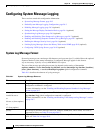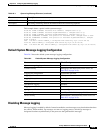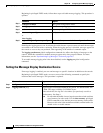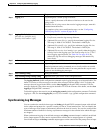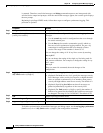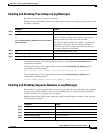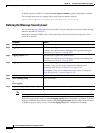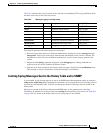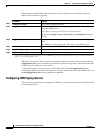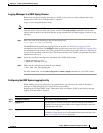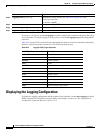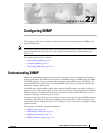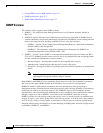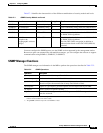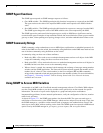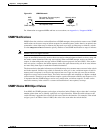
26-10
Catalyst 2960 Switch Software Configuration Guide
78-16881-01
Chapter 26 Configuring System Message Logging
Configuring System Message Logging
Beginning in privileged EXEC mode, follow these steps to change the level and history table size
defaults. This procedure is optional.
When the history table is full (it contains the maximum number of message entries specified with the
logging history size global configuration command), the oldest message entry is deleted from the table
to allow the new message entry to be stored.
To return the logging of syslog messages to the default level, use the no logging history global
configuration command. To return the number of messages in the history table to the default value, use
the no logging history size global configuration command.
Configuring UNIX Syslog Servers
The next sections describe how to configure the UNIX server syslog daemon and how to define the UNIX
system logging facility.
Command Purpose
Step 1
configure terminal Enter global configuration mode.
Step 2
logging history level
1
1. Table 26-3 lists the level keywords and severity level. For SNMP usage, the severity level values increase by 1. For example, emergencies
equal 1, not 0, and critical equals 3, not 2.
Change the default level of syslog messages stored in the history file and
sent to the SNMP server.
See Table 26-3 on page 26-9 for a list of level keywords.
By default, warnings, errors, critical, alerts, and emergencies messages
are sent.
Step 3
logging history size number Specify the number of syslog messages that can be stored in the history
table.
The default is to store one message. The range is 0 to 500 messages.
Step 4
end Return to privileged EXEC mode.
Step 5
show running-config Verify your entries.
Step 6
copy running-config startup-config (Optional) Save your entries in the configuration file.



